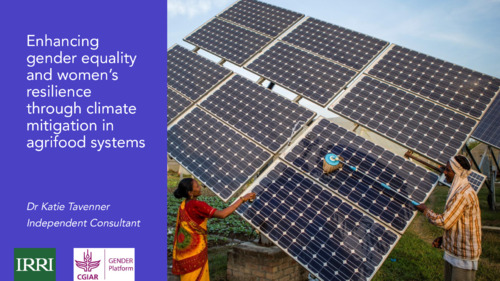Enhancing gender equality and women’s resilience through climate mitigation in agri-food systems
Abstract
Climate mitigation technologies and practices have the potential to enhance gender equality and women’s resilience to climate change, if underlying gender norms, intersectional social differences, and sociocultural dynamics are addressed in agrifood systems. This is the key takeaway from a 2023 IRRI scoping review of literature and learnings on gender and climate mitigation across six sectors— agro-ecology, agroforestry, conservation agriculture, improved livestock management, renewable energy, and water conservation. Using a three-prong methodology to gather data based on scientific studies, key informant interviews, and learning on the theme in close consultation with IRRI social and biophysical scientists, the study reviewed which climate mitigation activities had been tested and adopted by women farmers, considering mediating intersectional sociocultural dynamics. In collating good examples of gender-responsive climate mitigation interventions, different technologies, such as solar market gardens, biodigesters, and drought-resilient seeds reduce women’s labor burden, boost incomes, and promote more equal gender relations. Low-emissions dairy development, integrated landscape management and crop diversification, among other climate mitigation practices, also enhance women’s resilience to climate change. Strategies for addressing gender inequalities in climate mitigation are diverse and include co-designing and co-implementing interventions with women’s collectives and cooperatives, using social media to challenge discriminatory gender norms, and using drone technology to bridge gender gaps in access to climate services and information. Implications for the study include the need to engender climate advocacy, investment, and action across sectors.

